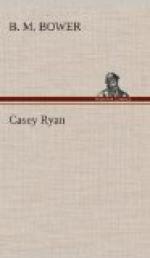He rested where he was for awhile and watched the slope for the pack animals; more particularly for William and the water cans. He could shoot rabbits and live for days, if he had a little water, but he had once tried living on rabbit meat broiled without salt, and he called it dry eating, even with water to wash it down. Without water he would as soon fast and let the rabbits live.
A dark speck moving in the sage far down the slope caught his eyes, and he got up and peered that way eagerly. He started down to meet it hopefully, feeling certain that his present plight would soon merge into a mere incident of the trail. Sure enough, when he had walked for half an hour he saw that it was William, browsing toward him and limping when he moved.
But William was bare as the back of Casey’s hand. There was no pack, no coal-oil cans of water; only the halter and lead rope, that dangled and caught on brush and impeded William’s limping progress. I suppose even miserable mules like company, for William permitted Casey to walk up and take him by the halter rope. William had a badly skinned knee which gave him the limp, and his right ear was broken close to his head so that the structure which had been his pride dropped over his eye like a wet sunbonnet.
Casey swore a little and started back along William’s tracks to find the water cans. He followed a winding, purposeless trail that never showed the track of burros, and after an hour or so he came upon the pack and the cans. Evidently the water supply had suffered in the wind, for only four cans were with the blankets and pack saddle.
William had felt his pack slipping, Casey surmised, and had proceeded to divest himself of the incumbrance in the manner best known to mules. Having kicked himself out of it, he had undoubtedly discovered a leaking can—supposing the cans had escaped thus far—and had battered them with his heels until they were all leaking copiously. William had saved what he could.
Casey read the whole story in the sand. The four cans were bent with gaping seams, and their sides were scored with the prints of William’s hoofs. In a corner of one of them Casey found a scant half-cup of water, which he drank greedily. It could no more than ease for a moment his parched throat; it could not satisfy his thirst.
After that he led William back along the trail until the mounting sun warned him that he was making no headway on his journey to the Tippipahs, and that with no tracks in sight he had small hope of tracing the burros.
It was sundown again before he gave up hope, and Casey’s thirst was a demon within him. He had wasted a day, he told himself grimly. Now it was going to be a fight.
Through the day he had mechanically studied the geologic formation of those hills before him, and he had decided that the chance for water there was too slight to make a search worth while. He would push on toward the Tippipahs. Pah, he knew, meant water in the Indian tongue. He did not know what Tippi signified, but since Indians lived in the Tippipah range he was assured that the water was drinkable. So he got stiffly to his feet, studied again the darkling skyline, sent a glance up at the first stars, and turned his face and William’s resolutely toward the Tippipahs.




